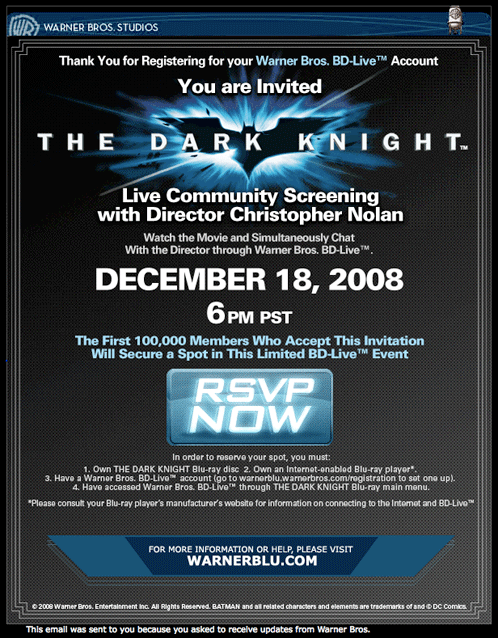I was one of the 600,000 people that purchased The Dark Knight on Blu-ray DVD on its first day of release. One of the neat features of certain Blu-ray DVD players is something called “BD-Live” that gives you the ability to add ongoing content and live functionality to your Blu-ray DVD purchase by connecting your Blu-ray DVD player to the internet via an Ethernet connection.

However, there is a Panopticonic risk in using BD-Live: You lose your
viewing anonymity and everything you do with BD-Live is recorded by the
movie company on their servers — for Dark Knight, you sign up on WarnerBlu.com
— and your account “talks to” your local BD-Live setup.
Since I am
one of the few in the 600,000 with a Blu-ray DVD player that can do
BD-Live, I was invited to a special online screening of the movie — via
BD-Live — with Dark Knight director Christopher Nolan.

1. Why is The Dark Knight such a hateful move? There is no love and zero honor in the entire two-and-a-half hour experience. There is only despair and complaining. Why do you think the movie was so successful? Are we all willing slaves to your sadistic thrashing of our aesthetic sensibilities?
2. Why does Batman “turn bad” at the end of the movie to cover up the five murders performed by Two-Face? Why is it honorable for a SuperHero to protect a killer? We don’t buy the notion that the Joker turned Two-Face bad. Two-Face was turned by his hatred and want for revenge. When Batman takes the fall for “the real hero gone bad” — the rest of us shudder at the ridiculous notion that the Batman from our childhood would ever for a moment allow himself to be the patsy for everything he fights against.



The Dark Knight is evil in its entire core and the hype over Heath Ledger’s performance is overblown — if he hadn’t killed himself, there would be no exclamation of, nor clamoring for, an Academy Award. Ledger is irritating in his lips-licking, murderous, sycophancy and instead of celebrating his performance; we should be mourning the notion that the daughter that never knew him will one day view his terrible, life-sucking, performance.
I wonder if my feelings about Heath coloured my viewing. I liked him in Brokeback Mountain. Perhaps if I had no idea who he was, I wouldn’t have liked it as much. Then again, I was a fan as a child of the monstrous character from which they took inspiration for the movie – supposedly The Killing Joke was one of the stories they looked to, and I remember reading that comic story a number of times in YMHA 🙂
Gordon —
When you have a character with no redeeming quality — and that’s the Joker in that movie — and that person just wants to “watch the world burn,” it makes one wonder why we bother watching the movie. Why is the Joker saved from death? If he is truly incorrigible and un-reformable, what’s the interest in salvaging that horror? Drama is about change. Batman changes. The rat changes. Morgan Freeman changes. Two-Face changes. The Joker does not change. He’s just the same old, same old. No surprises; and easy for an actor to play because it’s just the same lips-licking thing over and over…
I always thought the goal with nonredeemable characters was that the character had to be destroyed before you were destroyed. Did you feel that The Joker changed in the 1989 Batman? Just wondering.
Non-redeemable characters are tough to write and play, Gordon, because they only act. They have no growth. They are living, predictable, stereotypes. They need to express some sort of change over the period we are with them or they are unusable internally and our mind rejects them as a totem and not a meme.
The 1989 Joker didn’t change much, but Jack Nicholson is such a great actor that he was able to cover the bad writing and poor plot and thin character flaws by going over the top and replacing his personality with that of the Joker’s — Cesar Romero did the same thing in the ’60’s television series. So we weren’t watching the Joker, we were watching Jack and Cesar playing the Joker and while that sounds unreasonable, it is the only way to work with such a shallow character definition.